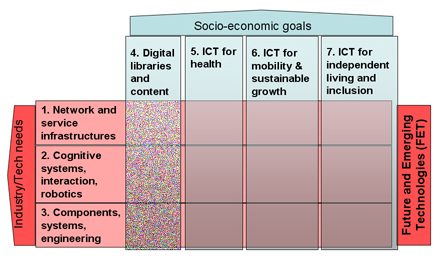FP7 ICT Work Programme Challenge 4:
Digital Libraries and Content

In today's society, individuals and organizations are, on one hand, confronted with an ever growing load of information and content and, on the other, with increasing demands for knowledge and skills. To cope with this, we need to link content, knowledge and learning, making content and knowledge more accessible, interactive and usable over time by humans and machines alike.
Europe, with its unique cultural heritage and creative potential, is well placed to exploit this paradigm shift, becoming a key actor in the knowledge economy.
ICT Proposers Day, KOLN 2007 1 February 2007, Cologne
Download the FP7 ICT Work Programme here.
Within the Directorate General Information Society and Media, the Directorate E: Digital Content and Cognitive Systems has the following structure:
- E.1: Interaction and Interfaces
- E.2: Content and Knowledge
- E.3: Cultural Heritage and Technology Enhanced Learning
- E.4: Digital Libraries and Public Sector Information
- E.5: Cognitive Systems and Robotics
- E.6: eContent and Safer Internet
Under FP6, Technology-enhanced Learning and Access to and preservation of cultural and scientific resources came under the call for
Applied IST research addressing major societal and economic challenges.
In FP7 they together become Challenge 4.1: Digital Libraries and Technology-enhanced Learning with calls under Challenge 4: Digital Libraries and Content.
Under FP6, the categories: Multimodal Interfaces,
Semantic-based Knowledge and Content Systems,
Cognitive Systems, Advanced Robotics, Search Engines for Audio-Visual Content came under the call for call for
Knowledge and Interface technologies.
In FP7, some of these categories become Challenge 4.2: Intelligent Content and Semantics responding to calls under Challenge 4: Digital Libraries and Content.
The remaining categories become Challenge 2: Cognitive Systems, Interaction, Robotics.
